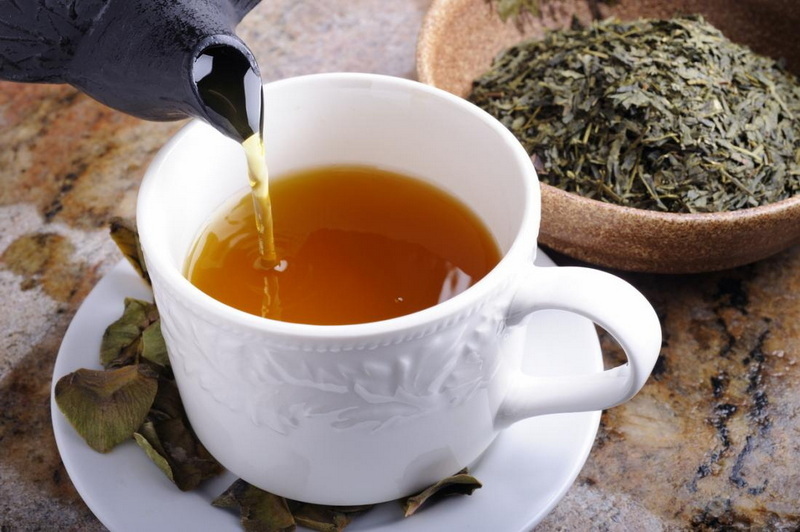Content Menu
● The Power of Polyphenols
● Metabolism and Weight Management
● Heart Health Benefits
● Cancer Prevention Potential
● Brain Function and Neuroprotection
● Diabetes Management
● Liver Protection
● Skin Health
● Exercise Performance and Recovery
● Immune System Support
● Oral Health
● Bone Health
● Conclusion
● Frequently Asked Questions
>> 1. How much green tea extract should I take daily?
>> 2. Are there any side effects of taking green tea extract?
>> 3. Can green tea extract interact with medications?
>> 4. Is it better to drink green tea or take green tea extract?
>> 5. Can green tea extract help with weight loss?
● Citations:
Green tea extract has gained significant popularity in recent years due to its potential health benefits. This powerful supplement, derived from the leaves of the Camellia sinensis plant, is packed with bioactive compounds that can have profound effects on various aspects of human health. In this comprehensive article, we'll explore the numerous ways green tea extract can impact your body, from boosting metabolism to protecting against chronic diseases.
The Power of Polyphenols
At the heart of green tea extract's benefits are its polyphenols, particularly catechins. The most abundant and potent of these is epigallocatechin gallate (EGCG). These compounds are known for their strong antioxidant properties, which help protect your body from oxidative stress and inflammation.

Metabolism and Weight Management
One of the most well-known effects of green tea extract is its potential to boost metabolism and aid in weight loss. The combination of caffeine and catechins in green tea extract can increase your body's ability to burn fat, particularly during exercise.
A systematic review of nearly 60 studies involving over 3,800 participants found that green tea extract significantly reduces body fat percentage. The effects were more pronounced in individuals under 50 years old. This suggests that incorporating green tea extract into your diet and exercise routine could potentially enhance your weight loss efforts.
Heart Health Benefits
Green tea extract has shown promising effects on cardiovascular health. Studies indicate that it may help reduce the risk of heart disease by:
1. Lowering total cholesterol levels
2. Increasing HDL (good) cholesterol
3. Reducing LDL (bad) cholesterol
4. Improving blood flow
Research estimates that the rate of heart attack decreases by 11% with the consumption of 3 cups of tea per day. While these studies often involve drinking green tea, supplementing with green tea extract can provide similar benefits with a more concentrated dose of beneficial compounds.
Cancer Prevention Potential
While more research is needed, some studies suggest that the antioxidants in green tea extract may help prevent the development and progression of certain types of cancer. The polyphenols in green tea have been shown to inhibit tumor growth in laboratory and animal studies.
Specifically, research has focused on green tea extract's potential benefits for:
- Prostate cancer
- Breast cancer
- Colorectal cancer
- Skin cancer
It's important to note that while these findings are promising, more human studies are needed to fully understand the cancer-fighting potential of green tea extract.
Brain Function and Neuroprotection
Green tea extract may also have positive effects on brain function and offer neuroprotective benefits. The combination of caffeine and L-theanine in green tea extract has been shown to improve cognitive performance, particularly in areas of memory and attention.
Moreover, some studies suggest that regular consumption of green tea extract may help protect against neurodegenerative diseases such as Alzheimer's and Parkinson's. The antioxidants in green tea extract may help reduce oxidative stress in the brain and protect neurons from damage.
Diabetes Management
Green tea extract shows promise in helping to manage type 2 diabetes. It may help regulate glucose in the body and improve insulin sensitivity. Some studies have found that green tea extract can help lower fasting blood sugar levels and reduce hemoglobin A1C, a marker of long-term blood sugar control.
Liver Protection
While green tea extract is generally considered safe, it's important to note that in rare cases, high doses may cause liver problems. However, when consumed in moderation, green tea extract may actually have protective effects on the liver. Some studies suggest it may help reduce the risk of liver disease and improve liver function in people with non-alcoholic fatty liver disease.
Skin Health
The antioxidants in green tea extract, particularly EGCG, may benefit skin health. They can help protect the skin from UV damage, reduce inflammation, and potentially slow signs of aging. Some studies have shown that green tea extract can improve skin elasticity and hydration when applied topically or consumed orally.
Exercise Performance and Recovery
Green tea extract may enhance exercise performance and recovery. The catechins and caffeine in green tea extract can increase fat oxidation during exercise, potentially improving endurance. Additionally, the anti-inflammatory properties of green tea extract may help reduce exercise-induced muscle damage and soreness, promoting faster recovery.
Immune System Support
The polyphenols in green tea extract have been shown to have immunomodulatory effects, potentially enhancing the function of the immune system. This could help the body better defend against infections and reduce the severity and duration of illnesses.
Oral Health
Green tea extract may contribute to better oral health. Its antibacterial properties can help reduce the growth of harmful bacteria in the mouth, potentially reducing the risk of cavities and gum disease. Some studies have also shown that green tea extract can reduce bad breath.
Bone Health
Emerging research suggests that green tea extract may have positive effects on bone health. The antioxidants in green tea extract may help prevent bone loss and reduce the risk of osteoporosis, particularly in older adults.
Conclusion
Green tea extract is a powerful supplement with a wide range of potential health benefits. From boosting metabolism and aiding in weight loss to protecting against chronic diseases and enhancing brain function, the effects of green tea extract on the body are diverse and significant. While more research is needed to fully understand all of its potential benefits and optimal dosages, incorporating green tea extract into your diet may be a simple way to support overall health and well-being.
As with any supplement, it's important to consult with a healthcare professional before adding green tea extract to your routine, especially if you have any pre-existing health conditions or are taking medications.

Frequently Asked Questions
1. How much green tea extract should I take daily?
The optimal dosage of green tea extract can vary depending on the specific product and your individual health needs. However, many studies have used doses ranging from 250-500 mg of green tea extract per day. It's best to start with a lower dose and gradually increase it while monitoring for any side effects. Always follow the dosage instructions on the product label and consult with a healthcare professional for personalized advice.
2. Are there any side effects of taking green tea extract?
While green tea extract is generally considered safe for most people, some potential side effects may occur, especially at higher doses. These can include:
- Caffeine-related side effects such as insomnia, nervousness, and increased heart rate
- Upset stomach or nausea
- Headaches
- In rare cases, liver problems
It's important to stick to recommended dosages and discontinue use if you experience any adverse effects.
3. Can green tea extract interact with medications?
Yes, green tea extract can interact with certain medications. It may affect the absorption of iron and certain medications, including some antibiotics and blood thinners. Green tea extract can also interact with stimulant drugs and increase the effects of caffeine. If you're taking any medications, it's crucial to consult with your healthcare provider before starting green tea extract supplementation.
4. Is it better to drink green tea or take green tea extract?
Both drinking green tea and taking green tea extract can provide health benefits. Green tea extract offers a more concentrated dose of beneficial compounds, which can be advantageous if you're looking for specific therapeutic effects. However, drinking green tea provides additional benefits such as hydration and the enjoyment of the tea-drinking experience. The best choice depends on your personal preferences and health goals.
5. Can green tea extract help with weight loss?
Green tea extract may aid in weight loss by boosting metabolism and increasing fat burning, particularly when combined with exercise. However, it's not a magic solution for weight loss. The effects are generally modest and work best when combined with a healthy diet and regular physical activity. Green tea extract should be viewed as a supplement to a comprehensive weight management plan rather than a standalone solution.
Citations:
[1] https://health.clevelandclinic.org/green-tea-extract-a-better-way-to-boost-energy-or-not
[2] https://pmc.ncbi.nlm.nih.gov/articles/PMC3649093/
[3] https://pmc.ncbi.nlm.nih.gov/articles/PMC6412948/
[4] https://www.alamy.com/stock-photo/green-tea-extract.html
[5] https://www.youtube.com/watch?v=kmlcjBJ05Sk
[6] https://www.youtube.com/watch?v=otxM65Fy_Ec
[7] https://www.mountsinai.org/health-library/herb/green-tea
[8] https://www.urmc.rochester.edu/encyclopedia/content?contenttypeid=19&contentid=GreenTeaExtract
[9] https://www.stanfordchildrens.org/en/topic/default?id=green-tea-extract-19-GreenTeaExtract
[10] https://www.freepik.com/free-photos-vectors/green-tea-extract
[11] https://www.webmd.com/vitamins/ai/ingredientmono-960/green-tea





























